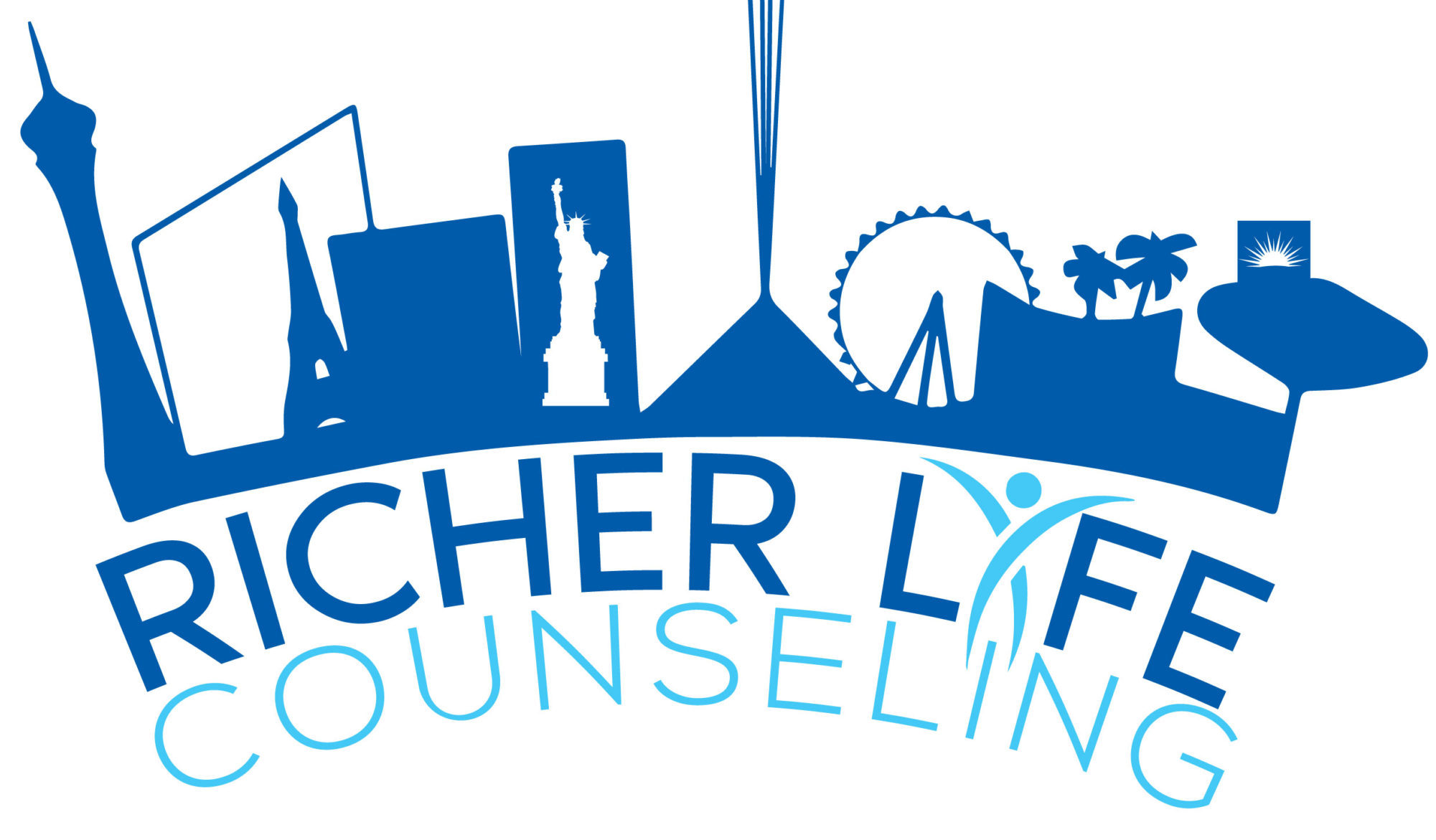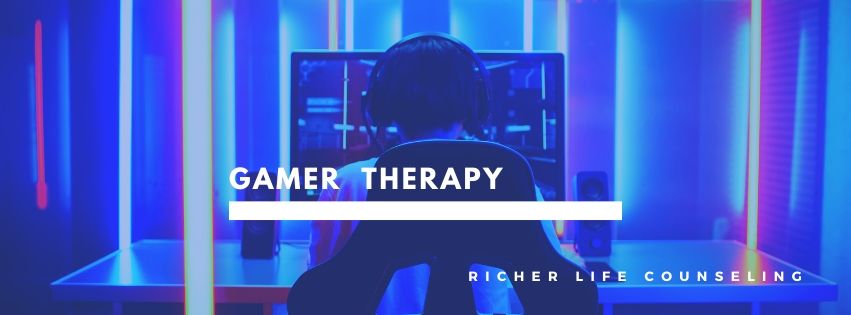Psychotherapy For Gamers
Video games have increased in accessibility, popularity, social connection, and competitive potential. With video games becoming more integrated within our daily lives, some of our mental health concerns can project, present, and exist inside this virtual space. What this means is that the problems that we have outside of gaming can find their ways into how we enjoy gaming. We may notice difficulties maintaining enjoyment, difficulty participating, managing anger, keeping track of time, or feeling ashamed/shamed about our interest. Although gaming has risen within our culture, it has not made it any easier to discuss these difficulties seriously. It is important to feel free to explore who you are and what you go through, which includes the media you use to connect to yourself and others. In an attempt to validate the experiences you may have, below are some ways these issues connect to deeper meaning.
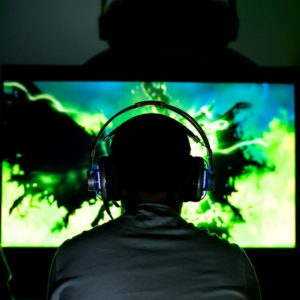
Like any other hobby, interest, or social meeting, how we interact and feel about video gaming helps us understand who we are and what challenges we are faced with. Below are some of the common ways that what we experience in game can speak about us. Note that this is not an exhaustive list and that I want you to share your personal experiences and challenges through gaming with us.
Gaming Depression
As visually stimulating, competitively provoking, deeply meaningful, or socially connecting as video games may be, that pleasurable experience may ebb, flow, or fade. It is hard for us to think or experience losses in joy with a hobby that had meant so much to us before; however, external forces may be at play, which interferes with our ability to connect to joy. The same themes that present within depression may find their way into our gaming experiences. We may find perpetual sadness in our abilities to overcome a challenge, or we may be experiencing criticism that sours the time spent in game. These symptoms left unaided foster hopelessness, shame, or guilt.
Gaming Anxiety
We hold expectations for many things, and gaming is no different. Whether we are soaking in a collective expectation to enjoy a game, having difficulty overcoming a challenge, climbing ladder/ranked playlists, or meeting the performance expectations from ourselves or others, gaming can show us how we carry and foster anxieties. How we experience these anxieties in gaming can show us our difficulties in feeling accepted and part of a community when having opposing beliefs, varied in game skill, or worries about value as a player or person.
Video Game Addiction
When we find ourselves consuming content for longer than we intended or at the detriment of our other responsibilities, obligations, or relationships, we can find ourselves facing this gunky term. When we discuss addiction, we have been trained to think that the solution is to cease any use and to get rid of it; however, this doesn’t work with video games as they may be crucial to how we connect, relax, and cope. What we are really looking at is why we have difficulty engaging in these other needs and attempting to foster motivations and balance. Video games are fun, and chores are not; however, we want to connect meaning to these other important needs to reduce feelings of shame and guilt about how we spend our time.
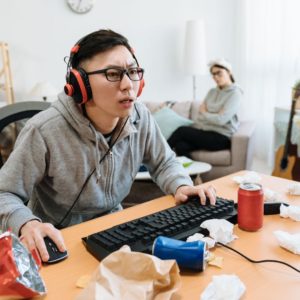
Identity, Role, Relationship Conflicts in Gaming
Playing into our previous discussion with addiction, we can experience criticism, dismissiveness, or rejection with how we spent our time. There are many reasons why we may experience friction with others, including the lack of expressing our interest and helping them understand frustrations over shared responsibilities or projection of their needs being interrupted by gaming. While we cannot control how others will hear or understand us, we can understand how our gaming impacts the environment we are a part of and our role in it. Our understanding aids in cultivating clarity and having the confidence to validate ourselves or engage in healthy change if needed.
Gamer Rage/Rage Quitting
Our previous topic points were to help illuminate how experiences with gaming could highlight how we respond through a depressive position; however, parallel to debilitating symptoms and experiences, our difficulties can manifest in irritability or anger. When unable to connect to feelings of excitement or joy, we can find ourselves lashing out at ourselves, those close to us, or even gaming developers and communities. This behavior presents when we’re not having fun, finding challenges overwhelming, or receiving criticism. Anger presents as a defensive and adaptive function in part due to feeling hopeless; however, it may also indicate difficulty accepting our abilities in game triggering fears of rejection from our own personal identity or position with peers, the community, or ladder.
Becoming A Better Gamer
Being an avid gamer, I have seen peers and clients struggle to acknowledge or recognize how debilitating or cyclical these scenarios may be. As it has been stated previously, who you are and what you experience is important AND critical to your treatment. Clients engaged within therapy find a voice to confidently express themselves and tackle sources of their distress through understanding where it affects them and why. Clients can expect to gain relief through navigating why they experience these symptoms and how to engage in meaningful change. Clients experiencing validation and normalization can also express themselves more authentically within home, school, and social environments allowing for the building of fulfilling and vulnerable relationships which align with the client’s values and beliefs.
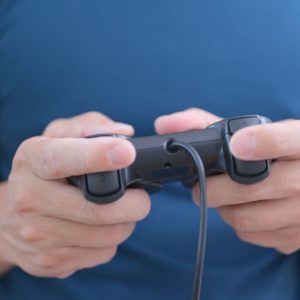
Gamer Therapy
Navigating these concerns within therapy helps reconnect to the joys of gaming; however, evolved to meet you at your level of development and growth. Whether it has the confidence to express your interests no matter what the collective shares or engaging in gaming with a desire to be competitive without allowing your rank to determine your worth, it is about experiencing it YOUR way. To cultivate relationships where understanding meets balance, having the confidence to assert boundaries regarding your interest and needs while also being aware of the other important roles that help you feel fulfilled.
What Keeps You From Leveling UP Your Life?
“It’s just video games.”
To those who have reached this segment, you know that it is not just a video game, but an emotional state of being that hits more deeply. It is presenting within your experiences in gaming; however, it signals a deeper understanding of who you are and what you are experiencing. Allow us to help you connect to this deeper meaning and navigate through these uncomfortable experiences.
“I can’t change their opinions anyway.”
We may be experiencing guilt, shame, or anger about who those around us interact with our interests; however, through multiple attempts of communicating, it may begin to feel hopeless. Therapy helps us understand what our needs are, how we are communicating it, and where our defenses may be distorting what we want. Parallel to connecting, therapy helps us recognize unhealthy relationships and cultivates confidence in utilizing our voice to begin change.
“I’m not the problem.”
While playing off of the last topic, whether we are guarded and unable to honestly express ourselves or need to acknowledge an unhealthy relationship dynamic, it is important to breathe life into this topic in order to engage in change. However, this is not the only way we disregard our ability to influence our experiences. In gaming, how often have you seen flaming or toxicity online? While we could either be the victim or toxic behavior or the perpetrator, it is important to have strategies to navigate gaming and an understanding of why it hurts so deeply when we find ourselves in one of these exchanges. Therapy helps understand our own wounds, which get activated as well as building the resilience to have a good and healthy defense.
From One Gamer To Another
As someone who has found part of their identity in gaming, I can help you work through whatever issues you have around gaming. No matter what type of gamer you are, you can level up your life and I am here to help contact us below to get started developing the most important character in your life….. YOU!
Therapist that work with issues around gaming
Contact us today by calling or texting 702-518-1546, email, or booking a session by hitting the appointment request button. We can normally get you into a session within 24 or 48 hours.
We offer both online therapy (learn more about online therapy here) and in-person therapy at our Las Vegas office. Our office is located in West Las Vegas right off the 95 & Rainbow. Our address is 222 S. Rainbow Boulevard | Suites 113-114 |Las Vegas NV 89145
